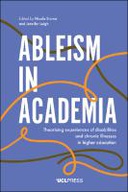Explore

Ableism in Academia
0 Ungluers have
Faved this Work
Login to Fave
Rather than embracing difference as a reflection of wider society, academic ecosystems seek to normalise and homogenise ways of working and of being a researcher. As a consequence, ableism in academia is endemic. However, to date no attempt has been made to theorise experiences of ableism in academia. Ableism in Academia provides an interdisciplinary outlook on ableism that is currently missing. Through reporting research data and exploring personal experiences, the contributors theorise and conceptualise what it means to be/work outside the stereotypical norm. The volume brings together a range of perspectives, including feminism, post-structuralism, crip theory and disability theory, and draws on the width and breadth of a number of related disciplines. Contributors use technicism, leadership, social justice theories and theories of embodiment to raise awareness and increase understanding of the marginalised – that is, those academics who are not perfect. These theories are placed in the context of neoliberal academia, which is distant from the privileged and romanticised versions that exist in the public and internalised imaginations of academics, and used to interrogate aspects of identity, aspects of how disability is performed, and to argue that ableism is not just a disability issue. This timely collection of chapters will be of interest to researchers in Disability Studies, Higher Education Studies and Sociology, and to those researching the relationship between theory and personal experience across the Social Sciences.
This book is included in DOAB.
Why read this book? Have your say.
You must be logged in to comment.
Rights Information
Are you the author or publisher of this work? If so, you can claim it as yours by registering as an Unglue.it rights holder.Downloads
This work has been downloaded 103 times via unglue.it ebook links.
- 103 - pdf (CC BY) at OAPEN Library.
Keywords
- ableism
- academia
- Chronic Pain
- Coping with disability
- Coping with personal problems
- Disability
- Education
- Family & health
- Health & personal development
- Higher & further education, tertiary education
- Higher Education
- illness
- physical impairment
- Social Justice
- Society & Social Sciences
- Sociology
- technicism
- thema EDItEUR::J Society and Social Sciences::JN Education::JNM Higher education, tertiary education
Links
DOI: 10.14324/111.9781787354975Editions

